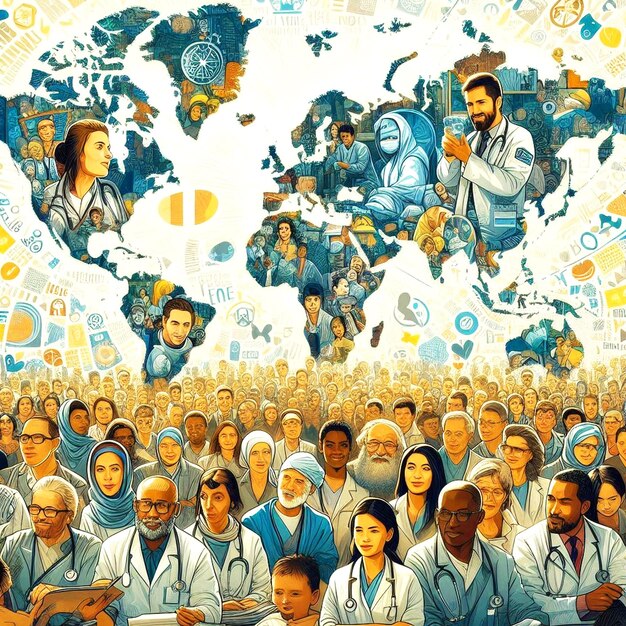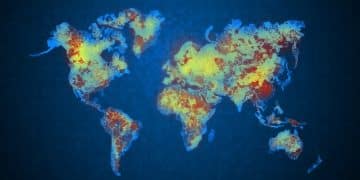How the US Addresses Global Health Crises: Funding, Research, and Efforts

How the US is Addressing Global Health Crises: A Look at Funding, Research, and Prevention Efforts involves a multifaceted approach encompassing financial contributions, scientific research, and proactive measures to mitigate global health threats and improve health outcomes worldwide.
Global health crises pose significant threats to international security and well-being, demanding coordinated and robust responses. How the US is Addressing Global Health Crises: A Look at Funding, Research, and Prevention Efforts involves a complex interplay of resources and strategies. This article delves into the various ways the United States confronts these challenges, examining its funding mechanisms, commitment to research, and implementation of preventative measures.
Understanding US Funding for Global Health
The United States is a major contributor to global health initiatives, allocating substantial funds to combat diseases, strengthen healthcare systems, and improve overall health outcomes in developing countries. This funding is channeled through various government agencies and international organizations, each playing a unique role in addressing global health challenges.
Key Funding Agencies and Their Roles
Several US government agencies are pivotal in distributing funds for global health programs. These agencies collaborate with international partners to maximize their impact and ensure effective resource allocation.
- The US Agency for International Development (USAID) is a leading agency that provides assistance to countries recovering from disaster, trying to escape poverty, and engaging in democratic reforms. It has several programs related to global health.
- The Centers for Disease Control and Prevention (CDC) provides a wide range of research and information on a variety of different diseases.
- The National Institutes of Health (NIH) is the institution responsible for biomedical and public health research.
- The Department of Health and Human Services (HHS) whose goal is protect the health of all Americans and provide essential human services.
These agencies work together and with other countries to achieve better health outcomes.

In conclusion, understanding US funding is how the US is Addressing Global Health Crises: A Look at Funding, Research, and Prevention Efforts. The agencies that work together to fund, research, and improve global health will continue to work together as health crises continue to arise.
Research Initiatives and Scientific Contributions
Beyond funding, the United States plays a crucial role in global health through its extensive research initiatives. American scientists and research institutions are at the forefront of developing new treatments, vaccines, and diagnostic tools for diseases that disproportionately affect low- and middle-income countries. These scientific contributions are essential for advancing global health security.
Advancements in Vaccine Development
US-based research has been instrumental in the development and distribution of life-saving vaccines. These advancements have significantly reduced the burden of infectious diseases worldwide.
- US scientists were foundational in the fight against polio, creating the vaccine and helping to eradicate it worldwide.
- US scientists are now at the forefront of the fight against HIV/AIDs creating medications that help to prolong and improve lives.
- The US was also at the forefront of the creation of the COVID-19 vaccines, providing them to its citizens and other countries.
The Role of US Universities
Many prominent US universities offer degrees and areas of research that are specific to world health. Students can research different diseases and work towards improving global health.

In conclusion, the US is contributing towards health research to help improve conditions around the world. How the US is Addressing Global Health Crises: A Look at Funding, Research, and Prevention Efforts is critical to protecting global health. In addition to preventative measures, research help save lives.
Prevention Efforts and Public Health Programs
Prevention strategies are a cornerstone of **how the US is Addressing Global Health Crises: A Look at Funding, Research, and Prevention Efforts**. The United States invests heavily in public health programs aimed at preventing the spread of infectious diseases, promoting healthy behaviors, and strengthening healthcare systems in vulnerable regions. These efforts are vital for building resilience against future health crises.
Training Health Professionals
One crucial aspect of prevention efforts is training healthcare workers in developing countries. Providing health professionals with the skills and knowledge to address local health challenges is essential for establishing sustainable healthcare systems.
- Public health degrees train people to work in the government and come up with plans that help achieve public health requirements.
- The Peace Corps also helps send volunteers to other countries to help improve their quality of life.
- Medical professionals can volunteer their time to go to other countries for a short amount of time to help the physicians in these countries.
The investment in preventative efforts and public health programs greatly improve global health. How the US is Addressing Global Health Crises: A Look at Funding, Research, and Prevention Efforts can also help to lower healthcare costs in the long run.
Global Partnerships and Collaborative Initiatives
The United States recognizes that addressing global health crises requires strong partnerships and collaborative initiatives. The US collaborates with foreign countries such as multilateral organizations, non-governmental organizations (NGOs), and other stakeholders to enhance the effectiveness of its global health efforts. These partnerships are essential for leveraging resources, sharing expertise, and ensuring a coordinated response to global health threats.
Collaboration with International Organizations
The US partners with international organizations to provide humanitarian assistance and work to improve the health and well-being of the world’s population.
- The World Health Organization (WHO) is an organization that provides leadership on global health matters, shaping the health research agenda, setting norms and standards, articulating evidence-based policy options, providing technical support to countries, and monitoring and assessing health trends.
- UNICEF works in over 190 countries and territories to save children’s lives, to defend their rights, and to help them fulfill their potential, from early childhood through adolescence.
- Gavi, the Vaccine Alliance, is an international organization that works to ensure equitable access to vaccines, especially in lower-income countries.
Collaborative initiatives with multilateral, NGOs, and other organizations greatly improve global health. How the US is Addressing Global Health Crises: A Look at Funding, Research, and Prevention Efforts also leverages funds for more effective solutions.
Challenges and Future Directions
Despite significant progress, the United States faces numerous challenges in its efforts to improve global health. These challenges include funding constraints, political obstacles, and the emergence of new health threats. Addressing these challenges requires innovative strategies, adaptive approaches, and sustained commitment to global health security. Continuing to address the problems will involve focusing on How the US is Addressing Global Health Crises: A Look at Funding, Research, and Prevention Efforts.
Adapting to Emerging Health Threats
The rise of infectious diseases and pandemics requires the United States to adapt its global health strategies. Investing in research and technology will also reduce new threats. The US needs to strengthen international collaboration as the world battles global health issues.
- Focusing on rapid response can help to reduce the spread of disease.
- The ability to adapt to the emerging diseases will help to save lives in the future.
- Using technology and research to help find solutions will further our health and well-being.
Continuing to advance and improve processes will help the US better collaborate with partners. How the US is Addressing Global Health Crises: A Look at Funding, Research, and Prevention Efforts will always be an ever-changing topic. The US is prepared to adjust to the changing climate of global health.
| Key Point | Brief Description |
|---|---|
| 💰 US Funding | The US is a major contributor to global health initiatives through agencies like USAID, CDC, and NIH. |
| 🔬 Research Initiatives | US scientists lead in developing treatments, vaccines, and diagnostic tools for global diseases. |
| 🩺 Prevention Programs | The US invests in public health programs worldwide. |
| 🤝 Global Partnerships | Collaborations with organizations like WHO and UNICEF enhance global health efforts. |
Frequently Asked Questions
The US is a big helper in global health by giving money, doing research, working with other countries, and stopping diseases before they spread. These are all elements of How the US is Addressing Global Health Crises: A Look at Funding, Research, and Prevention Efforts.
The amount of money that the US spends on global health varies each year. The US spends around $10 billion each year on global health and humanitarian work.
The US decides to focus on global health crises such as HIV/AIDs, the COVID-19 pandemic, and malaria. They often focus on areas of the world that have limited resources and developing countries.
US organizations work to stop diseases from spreading by giving out vaccines, teaching people how to stay healthy, and making sure healthcare systems are ready to handle outbreaks. All these factors contribute to future success.
In the future, the US will probably keep working with other countries, putting money into global health programs, discovering new ways to fight diseases, and preventing health crises from happening. This will continue for years to come.
Conclusion
In conclusion, the United States plays a vital role in how the US is Addressing Global Health Crises: A Look at Funding, Research, and Prevention Efforts. The United States is a major player in ensuring global health and looking out for the well-being of all people.





